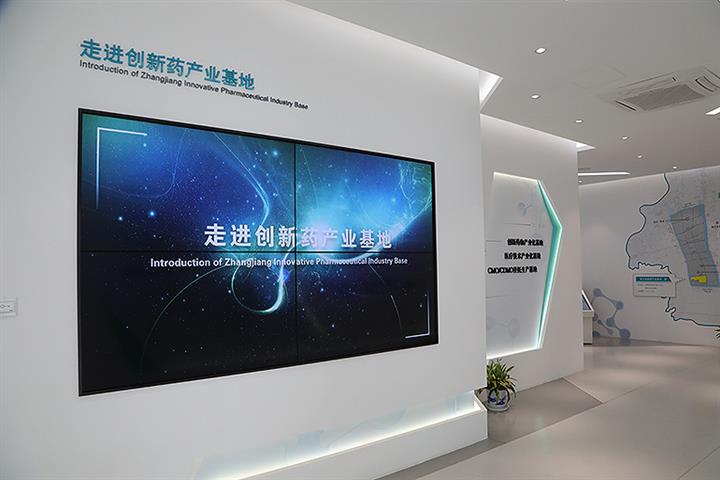 Shanghai’s Zhangjiang Expects Drug Output of USD4.2 Billion by 2025
Shanghai’s Zhangjiang Expects Drug Output of USD4.2 Billion by 2025(Yicai Global) Nov. 29 -- Shanghai's Zhangjiang Innovative Medicine Industry Base, a key hub for the mass production of first-in-class medicines in China, is forecast to grow rapidly in the next three years.
Set up in 2019, the base is expected to expand by two million square meters of working space and reach an output value of CNY30 billion (USD4.2 billion), per its latest plans.
The hub is there to help biomedical startups quickly turn scientific research into actual products, said Yao Chunjun, executive vice president of Zhangjiang Innovative Medicine Industrial Base Construction. The focus of interest is on advanced biomedicines in reference to the latest global developments, such as small molecule drugs, cell therapy, gene therapy, immunotherapy, and oligonucleotide drugs, Yao added.
The base is also dedicated to building basic facilities and bringing in service providers along the entire life sciences and health industry chains, such as platforms for cell culture media and contract developers and manufacturers.
All of these efforts can help scientists accelerate the conversion of their R&D into real medicines, Yao said. It can also help the base achieve the goal of maximum efficiency in land use, he said.
Top Location
Shanghai's biomedicine sector has flourished in recent years, Chen Kai, a member of the Chinese Academy of Sciences and a medicinal chemist said, adding that the city is emerging as a leading location in China for the sector with its innovative ideas and achievements.
Furthermore, local scaling up capabilities for R&D achievements in Zhangjiang have enabled Shanghai to become a thriving world-class pharmaceutical industrial cluster, presenting a quite promising development, Chen added.
Innovative drugs need industrial development, and the base is getting robust local support after setting up the production site, said Yang Xiaoming, chief technology officer of Fosun Kite Biotechnology, an innovative immune cell therapy joint venture of Shanghai Fosun Pharmaceutical and Kite Pharma of the United States.
Fosun Kite chose Zhangjiang Innovative Medicine Industry Base because it can help commercialise products quickly, Yang said, but it still took time for the whole process from land acquisition to factory construction, so the base helped find and negotiate with future neighbors to find the right place to accelerate the process.
Multi-Stage Services
To help project owners reach the target of industrial production, the base also provides services at every stage of the process, including prior period services, fundraising services, as well as general daily services after any new plant starts full operation, Yao added.
Chen Li, founder and chief executive of Hua Medicine, which makes diabetes drugs, said that his entrepreneurial success in Zhangjiang is inseparable from Shanghai’s unique advantages. Zhangjiang has attracted many world-renowned drugmakers, a number of contract research organizations, Chinese pharmaceutical firms, as well as a series of major scientific and technological centers, he added.
Xiao Zhihua, chairman of OPM Biosciences, said that after setting up its factory in Zhangjiang last year, the goal of the cell culture provider is to develop and produce locally in the area. Going forward, advantages in the supply of raw materials, CDMO services, and operations can accelerate the R&D of innovative drugs, Xiao added.
Editors: Tang Shihua, Emmi Laine, Xiao Yi